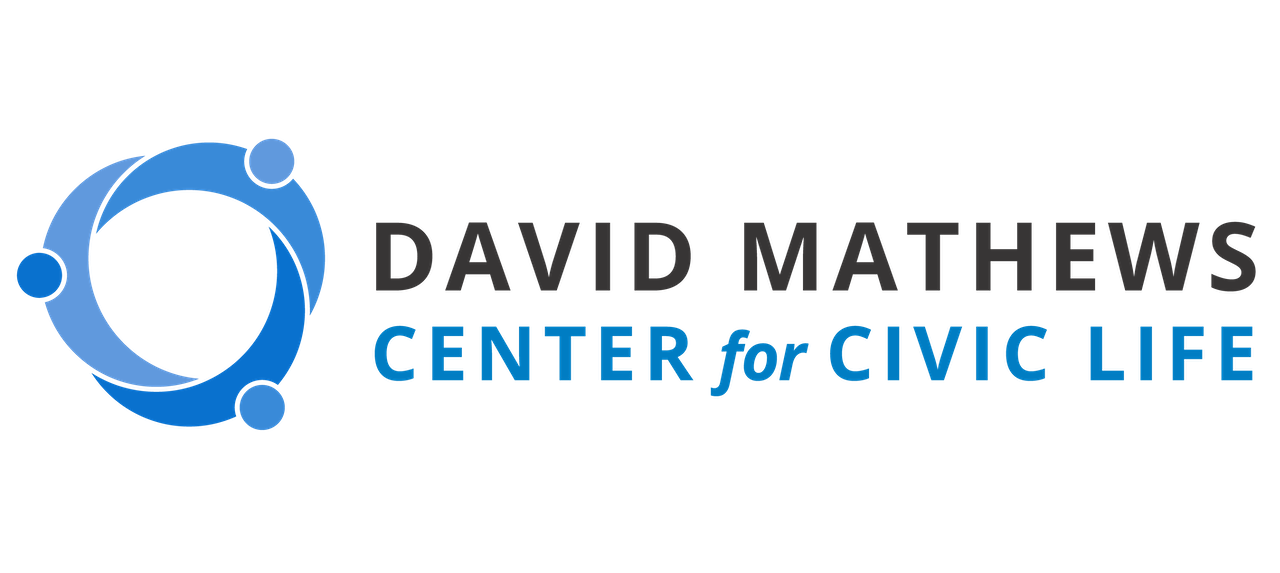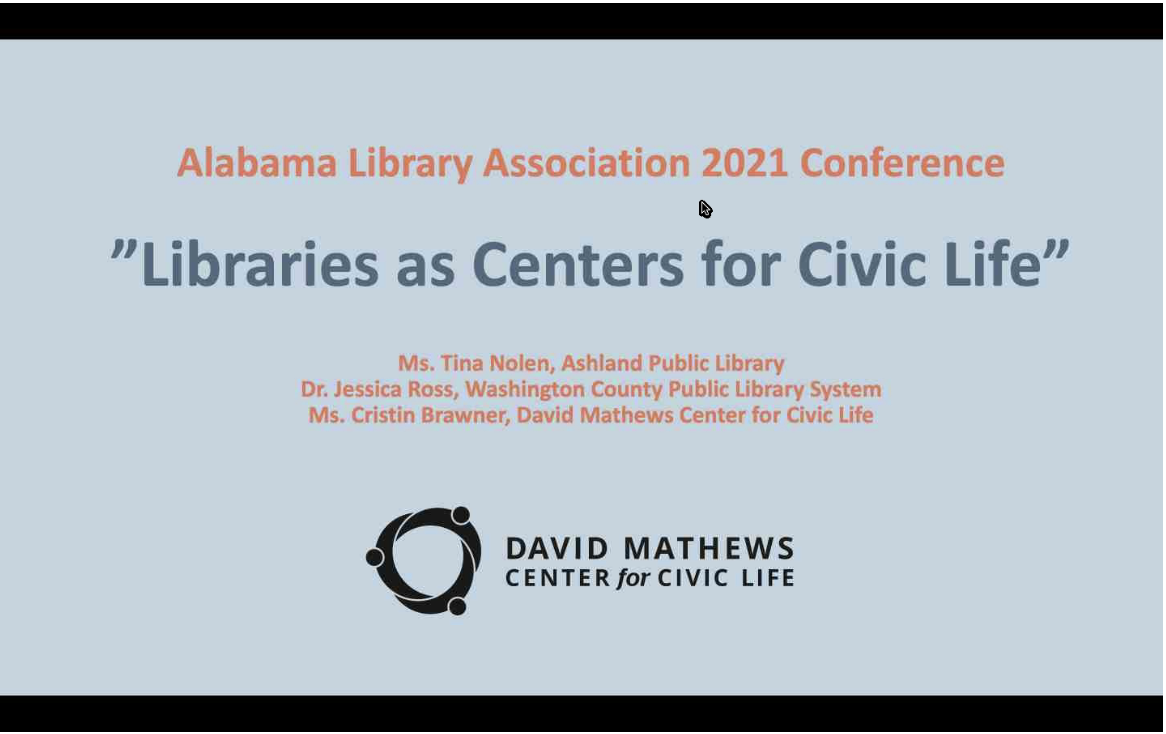Public Libraries in Alabama: Gateways to the Community
Throughout nearly two decades of serving civic life in Alabama, the David Mathews Center has worked closely with our state’s local libraries. Our programming has focused on engaging young people to be active citizens, and equipping communities to host deliberative forums as they seek to work better together; our partnerships with public libraries have helped us promote these objectives one community at a time.
DMC Executive Director Cristin Brawner says, “Libraries are one of the few trusted third spaces left in our country, where people can learn and access information equitably.” From the schoolhouse to downtown, libraries act as civic bridge builders between the public and their communities.
At the 2021 Alabama Library Association Conference, DMC Executive Director Cristin Brawner hosted a panel titled “Libraries as Centers for Civic Life.” Dr. Jessica Ross from the Washington County Public Library System and Ms. Tina Nolen from the Ashland Public Library shared their experiences as rural librarians who actively engage in civic programming. Hailing from small Alabama communities of roughly 2,000 people or less, both Dr. Ross and Ms. Nolen identified the importance of showing up in their communities to provide support and meet needs as they arise. In Ashland, a brand new resource center located across from the library will soon open to the public. Meanwhile, the Washington County Public Library recently added a career center within their building to better serve workforce development in the community. Both these vital community resources directly resulted from forums and meetings amongst key community members held in their respective libraries.
Dr. Ross described the career center process as “the stone soup of civic projects” due to the collaborative effort of the community and the array of talents and connections each individual contributed. Elected officials that attended forums and community meetings at the library gathered the various concerns of the region’s needs and sought solutions with connections they have outside the area. “The library is at the forefront of the community members’ minds when thinking of assessing needs like space and public programs,” said Dr. Ross. “It is a place where everyone has a voice and opportunity to speak. You can learn with others, gather to share ideas, and have conversations which can influence decision making across the community and beyond.”
As part of the 2017-2019 DMC What’s Next, Alabama? forum series, Ashland conducted 4-5 forums at the library with members of the public to assess the community’s assets, challenges, and opportunities. In this setting the plan for the new resource center was hatched, supported, and fulfilled thanks to the local library opening its doors to action-minded citizens. Acting as an extension of the library, the resource center plans to host a job fair for students in Ashland to receive professional advice on certification programs in the area. Ms. Nolen stated the goal of this endeavor is to give back, “In a rural community, many students graduate and move away from their hometowns for higher education. By bringing in local programs that can offer certification for various careers, young people can remain in Ashland and serve their community.”
For other library systems facing similar civic challenges, Dr. Ross and Ms. Nolen shared advice based on their experiences. “Offer a comfortable environment for people to get together and talk about difficult community topics,” Ms. Nolen suggested. She described how being honest about the issues faced day-to-day in the community is the first step to healing and improving for everyone. And in these crucial conversations, Ms. Nolen mentioned a positive point to remember, “Don’t be afraid to be uplifting and share what is working well in the community.”
Dr. Ross advised that libraries act as good partners to the community. “Share and learn from other local leaders on how to best serve the community. Partner with other organizations to help them succeed by providing technology, making space available, helping promote community events, and even attend town halls and functions.”
One thing both librarians emphatically agreed upon was the reciprocal support of the community and the importance of personal connections. “Get out of the office and meet community members face to face,” stated Ms. Nolen. “Call on people, everyone you can think of, to be involved and contribute to community events.”
“Building those community relationships is the key to getting things done successfully,” added Dr. Ross.
The success of the library systems in both Ashland and Washington County demonstrate the critical civic role the library plays in all communities, both rural and urban. By opening their doors to all, they welcome diverse opinions, voices, and ideas into an encouraging atmosphere with a collective mindset intent on positive change and growth for the community.
Last year, in an episode of the DMC’s Alabama Talks Back web series, Dr. Ross shared how the COVID-19 pandemic drastically changed the role of local libraries. Due to state and federal safety regulations, public libraries were forced to close their doors to the public in March 2020. The Washington County Public Library met this challenge head-on and adapted their programming to continue to meet the needs of their community. A drive-up system for checking out books was implemented for personal cases, and for the general public, crates full of popular books were placed outside the library for any interested community members to browse and take home.
The library went further to serve the Chatom community by partnering with the Chatom Emergency Management Agency to organize meetings amongst all the community organizations and officials to coordinate a pandemic response plan. Through the well-established relationships between community leaders and the library, over 100 community members met weekly via Zoom to discuss ways to support the various aspects of the Chatom population during the pandemic. In support of the local hospital to address a critically low blood shortage, a blood drive was conducted across the library campus that adhered to the COVID-19 safety guidelines. “That was a great opportunity for us to offer something that people wouldn’t normally associate with the library,” said Dr. Ross. “But it fulfills our mission to help, whatever that communication need is, whatever that informational need is, that’s where we want the library to fit in and offer services.”
As part of the DMC mission to equip young people and students to be active citizens, libraries have been a core part of our educational programming. School libraries have long encouraged students to build upon their reading and researching skills; in addition, they play an important part in the development of civic education.
The DMC’S latest partnership with the Albert L. Scott Library in Alabaster, Civic Life Lead to Read Book Club, focuses on introducing civic themes with a virtual audience via Facebook Live. Each monthly session features DMC AmeriCorp member Abby Holcombe and Alabaster librarian Frances Chriesman gathering to read books and demonstrate educational activities for students to do at home. Since August, the library has covered topics such as Native American Heritage, taking care of the earth, and women’s history.
Each Lead to Read Book Club session is hosted live on the Albert L. Scott Library Facebook page. April’s session discussing environmental impact and Earth Day can be watched here.
The DMC’s Homeroom parent/teacher newsletter recently featured libraries as the civic lesson of the week. From colonial history to modern day, students learn how essential libraries have been for civic life in communities. Read the issue and subscribe to the weekly newsletter here.
In his book Palaces for the People Eric Klinenberg writes: “Everyday life in libraries is a democratic experiment, and people cram into libraries to participate in it whenever the doors are open.” Although libraries have long served their communities with accessing resources, their pivotal role as civic centers cannot be understated. By opening their doors to the community, local libraries address needs and provide a space that is truly for the people, by the people.





